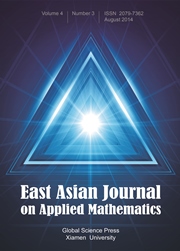No CrossRef data available.
Article contents
Application of gPCRK Methods to Nonlinear Random Differential Equations with Piecewise Constant Argument
Part of:
Numerical analysis: Ordinary differential equations
Probabilistic methods, simulation and stochastic differential equations
Published online by Cambridge University Press: 02 May 2017
Abstract
We propose a class of numerical methods for solving nonlinear random differential equations with piecewise constant argument, called gPCRK methods as they combine generalised polynomial chaos with Runge-Kutta methods. An error analysis is presented involving the error arising from a finite-dimensional noise assumption, the projection error, the aliasing error and the discretisation error. A numerical example is given to illustrate the effectiveness of this approach.
Keywords
MSC classification
- Type
- Research Article
- Information
- Copyright
- Copyright © Global-Science Press 2017
References
[1]
Babuska, I., Nobile, F. and Tempone, R., A stochastic collocation method for elliptic partial differential equations with random input data, SIAM J. Numer. Anal.
45, 1005–1034 (2007).Google Scholar
[2]
Beck, J., Nobile, F., Tamellini, L. and Tempone, R., Implementation of optimal Galerkin and collocation approximations of PDEs with random coefficients, ESIAM Proc.
33, 10–21 (2011).CrossRefGoogle Scholar
[3]
Ernst, O.G., Mugler, A., Starkloff, H.J. and Ullmann, E., On the convergence of generalized polynomial chaos expansions, ESIAM Math. Model. Numer.
46, 317–339 (2012).Google Scholar
[4]
Ghanem, R. and Spanos, P., Stochastic Finite Elements: A Spectral Approach, Springer-Verlag, New York (1991).Google Scholar
[5]
Hairer, E., Nørsett, S. P. and Wanner, G., Solving Ordinary Differential Equations I: Nonstiff Problems, Springer, Berlin (1993).Google Scholar
[6]
Liu, M., Ma, S. and Yang, Z., Stability analysis of Runge-Kutta methods for unbounded retarded differential equations with piecewise continuous arguments, Appl. Math. Comput.
191, 57–66 (2007).Google Scholar
[7]
Liu, X. and Liu, M., Asymptotic stability of Runge-Kutta methods for nonlinear differential equations with piecewise continuous arguments, J. Comput. Appl. Math.
280, 265–274 (2015).CrossRefGoogle Scholar
[8]
Narayan, A. and Zhou, T., Stochastic collocation on unstructured multivariate meshes, Commun. Comput. Phys.
18, 1–36 (2015).Google Scholar
[9]
Shi, W. and Zhang, C., Error analysis of generalized polynomial chaos for nonlinear random ordinary differential equations, Appl. Numer. Math.
62, 1954–1964 (2012).Google Scholar
[10]
Shi, W. and Zhang, C., Generalized polynomial chaos for nonlinear random Pantograph equations, Acta Math. Appl. Sin. English Ser.
32, 685–700 (2016).Google Scholar
[11]
Tang, T. and Zhou, T., Recent developments in high order numerical methods for uncertainty quantification, Sci. Sin. Math.
45, 891–928 (2015).Google Scholar
[12]
Wang, W. and Li, S., Dissipativity of Runge-Kutta methods for neutral delay differential equations with piecewise constant delay, Appl. Math. Lett.
21, 983–991 (2008).CrossRefGoogle Scholar
[13]
Wang, W., Stability of solutions of nonlinear neutral differential equations with piecewise constant delay and their discretisations, Appl. Math. Comput.
219, 4590–4600 (2013).Google Scholar
[14]
Wiener, J., Generalized Solutions of Functional Differential Equations, World Scientific, Singapore (1993).Google Scholar
[15]
Xiu, D., Fast numerical methods for stochastic computations: A review, Commun. Comput. Phys.
5, 242–272 (2009).Google Scholar
[16]
Xiu, D., Numerical Methods for Stochastic Computations: A Spectral Method Approach, Princeton University Press, Princeton, New Jersey (2010).Google Scholar
[17]
Xiu, D. and Karniadakis, G.E., The Wiener-Askey polynomial chaos for stochastic differential equations, SIAM J. Sci. Comput.
24, 619–644 (2002).Google Scholar
[18]
Zhou, T., A stochastic collocation method for delay differential equations with random input, Adv. Appl. Math. Mech.
6, 403–418 (2014).Google Scholar


